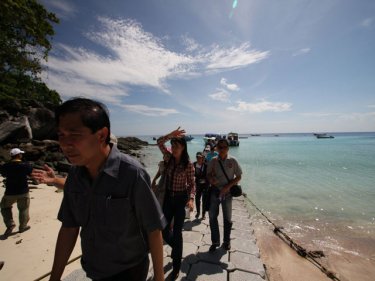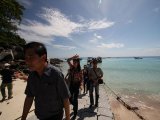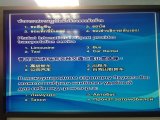There are no official lifeguards on the beach at Racha's Ao Tawan Tok, where eight Chinese tourists have drowned in the past 10 months.
Governor Maitree Intrusud, officials and a contingent from Phuket's media travelled yesterday by speedboat to the island to see the deadly beach for themselves.
Inevitably, it was a beautiful calm day without a hint of the dangers. Yet even a moderate swell can make this arc risky for tourists who are poor swimmers or even non-swimmers.
The conversation on the beach was alarming enough.
Sarit Jandee, a member of Racha's Conservation Group, doesn't believe the tourists are properly protected. Guides and boat crews are more interested in making extra money, he says.
Some of Phuket's media asked one accompanying official, the chief of Phuket's Marine Office 5, Phuripat Theerakulpisut, whether the speedboat guides and crews followed the rules in ensuring tourists were safe.
Khun Phuripat: ''If they do not follow the rules I will have to cancel their permits. I don't want to do that.''
It was a revealing comment. Governor Maitree told Khun Phuripat that he had to enforce the law.
Khun Phuripat: ''Governor, I guarantee that most tourists who drown here drown with lifejackets on.'' [inferring that all safety precautions are being taken.]
Khun Sarit, interrupting: ''That's not true. Only perhaps one in 10 of the drowning victims here dies with a lifejacket on.''
Later, in his summary to the media, the governor seemed to go along with Khun Phuripat and accept that the spate of drownings is coming because individual tourists are failing to take proper precautions to protect their own lives.
Phuketwan is not so sure. We noted that Chinese tourists on the beach yesterday were, with just two exceptions, not wearing lifejackets.
We don't think we would see many more in lifejackets, even on a riskier day.
The reason could be that if day-trip customers wish to wear lifejackets during the lunch break on the beach, the boat crews usually ask them to pay an extra 50 baht.
That proves to our satisfaction that money, not safety, is the main priority for the boat crews and the tour operators.
Eight deaths in 10 months on one small beach also indicates that if the tourists are being properly supervised, then their supervisors are either uncaring or incompetent.
Allowing a non-swimming Chinese to hire a boogie board would, we believe, be a sign of both incompetence and lack of care. Commissions are paid, though, for these dangerous hirings.
When the number of drownings on Racha is combined with the drownings of tourists and Thais on Phuket's own beaches so far this year, it becomes evident that marine safety is lacklustre on Phuket and at its premium day-trip destination.
Khun Sarit maintains that the guides and boat crews are more interested in making extra money than protecting their customers.
Nothing we saw or heard yesterday indicated otherwise. And if what Khun Sarit says is true, there will be more deaths.
Instead of applying the rules, instead of making sure the crews and the guides are doing their jobs properly, Khun Phuripat will continue to blame the victims.
However, the high numbers of drownings should worry the governor and other Phuket administrators.
If the Chinese Government stops tourists from coming to Phuket, scores of crews and guides will be thrown out of work.
At present, Khun Phuripat appears to be protecting the boat crews and guides much better than the boat crews and guides are protecting the tourists.
We wonder what he will have to say to the guides and the boat crews if their jobs are lost.
Phuketwan has one suggestion: Stop the crews from charging extra for the lifejackets and have them instead insist that the day-trippers take the jackets with them during their lunch and swim break.
For free. As a sign that the tour operators want to keep their customers alive.
If that happens, the media and Phuket authorities will quickly be able to determine whether the individual tourists or the corrupt system is to blame for drownings.
In other moves, the governor aims to ask Phuket's Public Health department to provide training in revival techniques to locals on Racha and to ask the Royal Navy why the response time for its helicopter can't be made more effective.
Unlike many other international beach destinations, Phuket has no specialised emergency helicopter service.
Khun Sarit's suggestion of establishing an emergency clinic on Racha is not likely to win support because only 10 families live on the island, the governor said.
Marine safety was raised in May by the Chinese ambassador and again a few weeks later at a meeting of European Union ambassadors.
A water safety summit, with the backing of the British Embassy, was provisionally scheduled for October on Phuket. Bureaucratic delays mean it could be held, with luck, in November or December.



















Phuripat seems to be very, very protective of his field, and can not accept any changes/criticism at all.
It really is time somebody with a broader view took on his role.
Posted by stevenl on October 13, 2013 14:38